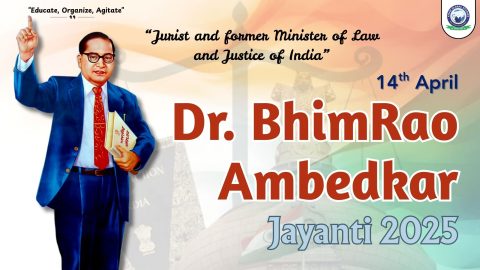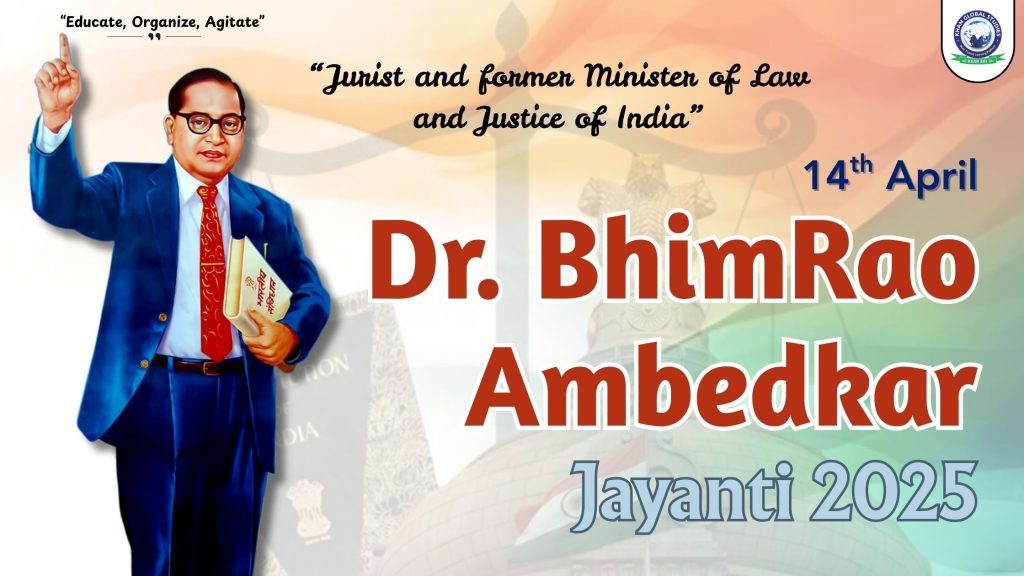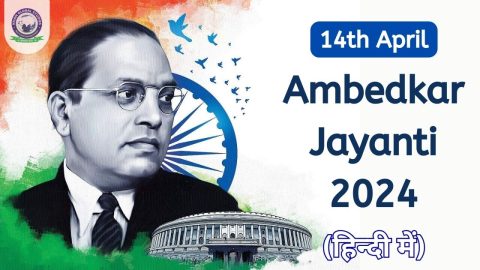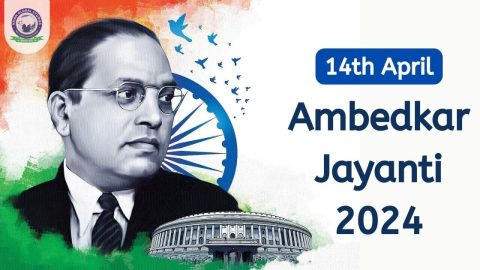Dr. Bhimrao Ambedkar was born on 14 April 1891 in the Mhow Cantonment of Madhya Pradesh. He belonged to the Mahar caste, which was considered “untouchable” at that time. His father, Ramji Sakpal, served as a Subedar in the British Army and instilled in him the values of discipline, honesty, and dedication. From a young age, Ambedkar faced caste-based discrimination and social neglect, but he never gave up.
Early Education and Struggles
Ambedkar received his early education in cities like Satara and Mumbai. At school, he was often made to sit on the floor and was even denied access to drinking water. Despite these humiliations, he chose education as his weapon. His admission into the prestigious Elphinstone College proved that knowledge transcends social boundaries. For Ambedkar, education was not just a means of personal advancement but a tool for societal upliftment.
Foreign Education and Academic Excellence
In 1913, he received a scholarship from the Maharaja of Baroda, which enabled him to study in the United States at Columbia University. There, he earned an M.A. and a Ph.D. in Economics. He then went to London, where he completed a D.Sc. from the London School of Economics and studied law, becoming a Barrister-at-Law. His academic achievements were not just a personal triumph but a source of inspiration for the entire nation.
Social Movements and Activism
After returning to India, Ambedkar began working for the upliftment of the most marginalized communities. In 1924, he founded the Bahishkrit Hitkarini Sabha. 1927, through the Chavdar Lake Satyagraha, he secured access for Dalits to public water sources. In 1930, with the Kalaram Temple Satyagraha, he demanded equal entry for Dalits into temples. These movements marked significant milestones in the fight for social equality.
Political Engagement
Ambedkar believed that political power was essential for social transformation. In 1936, he founded the Independent Labour Party and was elected to the Bombay Legislative Assembly in 1937. He strongly advocated for the political rights of the Dalits. Later, he founded the Scheduled Castes Federation, which became a platform for social and political advocacy.
Drafting the Indian Constitution
After India’s independence in 1947, Ambedkar was appointed Chairman of the Constitution Drafting Committee. He played a pivotal role in formulating the Indian Constitution, which was adopted on 26 November 1949. The Constitution enshrined values like equality, liberty, secularism, and social justice. His vision was of a society where every individual could live with dignity.
Religious Conversion and Turn to Buddhism
Disillusioned by the caste system in Hinduism, Ambedkar embraced Buddhism on 14 October 1956 in Nagpur. He declared, “I was born a Hindu, but I will not die a Hindu.” Along with him, millions of followers also converted to Buddhism. This move was not merely religious—it was a powerful act of social revolution and resistance.
Writings and Intellectual Contributions
Ambedkar was a profound thinker and prolific writer. His major works include Annihilation of Caste, Who Were the Shudras?, and The Buddha and His Dhamma. He wrote extensively on topics like the Constitution, society, religion, and economics. His thoughts continue to inspire movements for social reform and equality today.
Support for Uniform Civil Code
Ambedkar was not only a champion of social equality but also a strong proponent of the Uniform Civil Code. He believed that in a modern and scientifically-minded India, there was no place for personal laws. During the debates in the Constituent Assembly, he strongly advocated for the adoption of a Uniform Civil Code to bring reform in Indian society.
Electoral Defeat and Role in Rajya Sabha
In the 1952 general elections, Ambedkar contested as an independent candidate from the Bombay (North-Central) constituency but was defeated. He secured 123,576 votes, while the Congress candidate Narayan Sadoba Kajrolkar received 138,137 votes. Subsequently, in March 1952, he was nominated to the Rajya Sabha, where he served until his death.
Economic Contributions and Vision
Dr. Ambedkar was the first Indian to earn a doctorate in Economics from abroad. He believed that industrialization and agricultural reforms were key to India’s economic growth. He emphasized agriculture as a primary industry and called for investment in the sector. According to Sharad Pawar, Ambedkar’s vision helped India in achieving its food security goals.
He viewed education, public hygiene, healthcare, and housing as fundamental to national development. He analyzed the economic damage caused by British colonialism and proposed concrete plans for India’s self-reliance.
Reserve Bank of India and Economic Writings
Ambedkar was not just a sociologist and politician, but also a skilled economist. By 1921, he had earned a reputation as a professional economist. His three key economic works—
- Administration and Finance of the East India Company
- The Evolution of Provincial Finance in British India
- The Problem of the Rupee: Its Origin and Its Solution
—reflect his deep understanding of economics. The establishment of the Reserve Bank of India was based on his recommendations to the Hilton Young Commission, demonstrating his foresight and solid economic vision.
Role in Women’s Empowerment
Dr. Ambedkar is also considered one of India’s foremost feminist thinkers. Through his writings and actions, he continuously worked to improve the social, political, and economic status of women. He asserted that before the time of Manu, women in Indian society enjoyed respect, education, and religious freedom, but Manusmriti severely damaged their position.
Through newspapers like Mooknayak and Bahishkrit Bharat, he raised awareness among women about their rights. In 1941, when the government introduced the Hindu Code Bill to empower women, Ambedkar, as Law Minister, took it upon himself to implement it. Despite facing opposition from orthodox forces, he never abandoned the struggle for equal rights for women.
Death and Legacy
Dr. Ambedkar passed away on 6 December 1956 in Delhi. His death marked the loss of a great thinker, social reformer, and nation-builder. In 1990, he was posthumously awarded the Bharat Ratna. Today, numerous memorials, institutions, and research centers stand in his name, preserving and promoting his ideas.
Conclusion
Dr. Ambedkar’s vision extended far beyond social reform. He was also a pioneer in economic planning, legal rights, and women’s empowerment. His ideas remain deeply relevant today and continue to guide the path toward a just, scientific, and inclusive India.
The life of Dr. Bhimrao Ambedkar is a shining example of struggle, education, justice, and social harmony. He not only fought against untouchability but also gifted India a Constitution that guarantees equal rights and dignity to all. His message—“Educate, Organize, Agitate”—remains a beacon for every section of society. He is not just the pride of the Dalit community, but of the entire nation.
Also Read:






